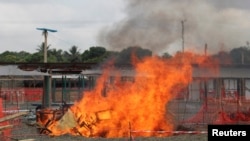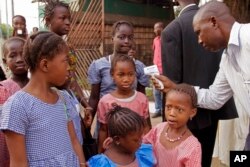Efforts to slow the worst-ever outbreak of Ebola are shifting to a focus on ending the epidemic and rebuilding the three West African countries that it has devastated.
The World Health Organization said Thursday that the number of new cases fell to its lowest weekly level since June. A total of 99 new cases were reported last week among Guinea, Liberia and Sierra Leone, according to WHO figures.
Sierra Leone saw a huge reduction with 65 new cases last week, compared to 117 the week before and 184 three weeks ago.
In Liberia, where the Ebola outbreak peaked much earlier, there were four new cases last week, down from a high of 300 per week in August and September.
The WHO said in the new "second phase" of its response, officials will stop working to rapidly build facilities and focus instead on efforts to find infected people, manage their cases, engage with communities and ensure proper burials.
Reconstruction meeting planned
U.N. Ebola coordinator David Nabarro also said governments and international organizations plan to meet in March to set a course for rebuilding the three countries.
"The plans at the moment are for a conference to look at the needs of reconstruction," Nabarro said, adding it would be "organized by the countries themselves," plus the United Nations, the African Union and European Union.
Nabaro, who's attending the African Union summit in Addis Ababa, told Reuters the meeting likely would take place March 3 in Brussels. By then, he anticipates "estimates for what the whole recovery and revival will cost," he said.
Earlier this month, the World Bank projected the three countries would lose $1.6 billion in income, more than 12 percent of their combined economic output, Reuters said.
The United Nations has received commitments for about $500 million of the $1.5 billion it will need to respond to the crisis this year, Nabarro said. "We will need more for the response, but also there will be funding needed for reconstruction."
While the Ebola epidemic is decreasing, Nabarro warned that the disease remains present in a third of the areas of the three nations.
"The number of cases is decreasing week by week and getting to zero in many places ... but we still see occasional flare-ups and we still see some surprises with new cases out of our contact lists," Nabarro told the French news agency AFP.
"That means that the epidemic is not contained yet," he said, adding that the upcoming rainy season is cause for concern.
'Dangerous situation'
Dr. Bruce Aylward, who is leading WHO's Ebola response, sounded a similar warning.
"This is like being in bed with two cobras, and one of them is dead," Aylward told The Associated Press. "You still have an incredibly dangerous situation." He added that Ebola outbreaks often come in waves.
Speaking at a WHO Ebola meeting last Sunday, Jerome Oberreit, secretary general of Doctors Without Borders, said there is virtually no sharing of Ebola information about the risks of cases crossing the borders among the three countries in West Africa.
Oberreit said surveillance teams lack even basic resources to track down Ebola patients and blamed "international negligence" for the inability to contain the outbreak.
The U.N.'s Nabarro said there were key lessons from the response to Ebola. A proposal to set up an African equivalent to the United States' Centers for Disease Control and Prevention (CDC) would be a step forward, he said.
"It took us too long to be ready. We need a better response capacity," Nabarro said.
The 54-member African Union will meet in Ethiopia on Friday and Saturday. Representatives are set to discuss the CDC center, which in its initial phase would operate as an early warning system. They'll also discuss Ebola-affected countries' economic recovery, as well as establishment of a "solidarity fund."
Through January 25, there were more than 22,000 total suspected and confirmed cases since the outbreak began in December 2013. About 8,800 people have died.
Some material for this report came from AP, AFP and Reuters.






